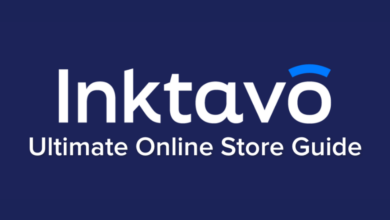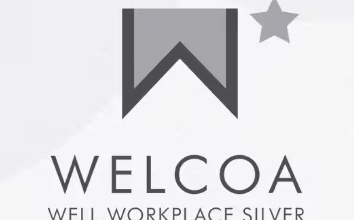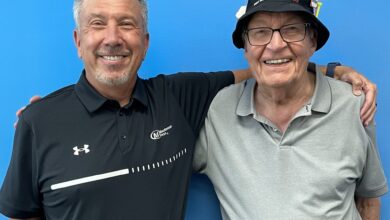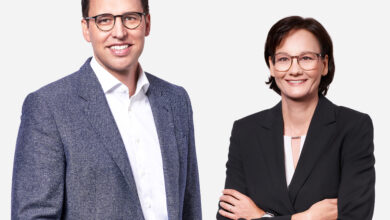A&E Asks: Ryan Huddleston of Enduramark
Get to know the creator behind Enduramark in this exclusive interview.

Ryan Huddleston, the co-founder and creator of Enduramark, may have started with a background in chemistry, but his knowledge on a variety of subjects has only grown to serve his competitive and entrepreneurial nature. Keep reading to learn how he accidentally came into the engraving industry.
*How and when did you first get involved in this industry? What drew you to it?
I found the industry by accident. I owned another athletic goods company, and through my involvement with that business and looking at different products, we started importing stainless-steel insulated water bottles. This was maybe five or six years ago. The whole (stainless-steel) mug craze started to happen as well. We had these water bottles that were selling, but we didn’t do any customization; I wasn’t in the laser or personalization business at that point in time. We started to work with a lot of smaller cross-fit gyms and the like, and we had people reaching out to us saying, “Hey, can you customize our logo on these items?” I’m always looking at new business opportunities, so we explored that a little bit. Then, I stumbled upon lasers and started investigating.
At this time, coated items, which is kind of the new big thing in the stainless-steel industry, weren’t available – it was all just raw stainless steel. In trying to figure out how to mark these, I came across the lasers and discovered a product to mark on stainless steel. Originally, we used a laser in a tech shop that we had a membership to. The volume we were engraving started to grow and we eventually made our first laser purchase. That’s how I accidentally got in the whole industry.
*What was the process like to develop and produce Enduramark?
When we started, we were using a competitor’s product for our water bottles. I have a master’s degree in chemistry from the University of Texas at Austin; I thought the competitor’s product worked well, but also thought there were some improvements that could be made. I said, okay here’s an interesting thing. Could we possibly do this or improve on this?
The idea percolated in my mind for a couple of years; I didn’t really have a facility or resources to be able to work on it. As my other businesses grew and time became available, I started collecting information, looking at the patent literature, and other literature available. I quickly discovered the key steps to making a competitive product. From there, I spent time optimizing and making sure we had a product that was good enough to be able to explore the commercial markets.
I certainly didn’t set out with the mindset of, let’s start a metal-marking company or let’s develop a new engraving company. These things are all sort of offshoots that occurred as a result of keeping my eyes open. After we developed our initial black product, we made some other interesting discoveries and eventually developed a couple of other products for metal marking. The choices for metal marking are pretty limited at this point, as far as variations go.
*How did you and your business partner, Jason, get together?
Jason and I went to college together – that’s how we first met. I moved down to Texas and then was able to, several years later, convince him to quit his nice telecom job and start a chemistry research and development lab. Our lab did contract research for the pharmaceutical industry. We ran that business for six years, until we saw an exit point. We got offered for someone to buy the business, so we sold it and eventually moved on to the athletic stuff, and the engraving stuff came later. In all the businesses that we’ve done, we’ve always been business partners together. We’ve been working together for almost 15 years. I think that’s a good sign of a relationship that works well together.
*In what ways would you say you and Jason balance each other out to run your business?
We bring different strengths and weaknesses to the table. Where all this lays out really depends on the particular business. With Enduramark, Jason is not a chemist by training, but he has an accounting and finance background. Jason handles the financial aspects of the business, and I would say is the more pragmatic of the two of us.
Sometimes when you’re in the mindset of innovation and inventing products, you can come up with nice ideas that have no commercial value. It’s good to have somebody who sits relatively outside of the research and development realm of Enduramark to look at stuff objectively and say, “Okay, this is a good idea,” or, “That’s a nice idea, but I think there’s probably six people in the world that would want to buy it.” Jason has a good hand in that aspect of the business as well, but it depends on the business we run. I may be the one that puts on the brakes on certain things; it depends on the particular situation.
*What is your philosophy for success?
Every business has problems. It’s rare that you are going to run a business that doesn’t have problems that it faces on a daily, if not weekly, basis. Embrace the problems. I think the people that are most successful don’t necessarily look at these problems as being irritations, but opportunities is how I think of them. For entrepreneurs, it’s how you solve these problems and your ability to do it quickly and efficiently that defines whether or not you’re going to be successful or not successful. One of the things that I’ve learned over the years is you’re never going to have a business that runs 100% smoothly.
Make sure you continuously move forward, and you don’t become complacent. Complacency, I think, is a real danger for most businesses, especially if you have success. It’s easy to think that things aren’t going to change, but the reality is the technology continually changes and the competitors are always looking at ways to compete and beat you.
I think a reasonable amount of paranoia is always good. Make sure you’re prepared for whatever the future holds. Our philosophy in business is generally quite conservative in balancing the risks associated with business…
*What is your favorite aspect of your work?
The thing that I find most fun is coming up with an idea, figuring out exactly how we’re going to make it work, and then commercializing the idea; that part is the most exciting. It’s exciting to come up with a core idea and to figure it out, but ultimately having an idea that other people think is cool is gratifying. It’s how you develop ideas; I think in general ideas are a dime a dozen. It’s what you do with them and whether or not you’re able to commercialize them. It’s the gratification that comes from the entire process. It’s one thing for me to be excited, but when you can generate excitement in other people, I think that’s a sign that you’re doing something special.
*Describe a time in your career that posed a great challenge. How did you overcome it?
Going back to the athletic company that I had, at the time, it was a cute, little business but it wasn’t really growing significantly. It was frustrating at times that we weren’t able to get enough traction or enough movement to really drive that business forward and grow it like we wanted to. Continuously having to go through that process of here’s our product lineup, what can we add to it to introduce a new audience or create a new audience. There was a time in our business where it was really frustrating and didn’t really seem like it was going anywhere. But then we kept looking at new products and saw that the (stainless-steel) mugs were getting pretty cool. Getting into that was interesting; it was just a matter of keeping my head down and coming up with that idea. That’s led to everything else.
I could have easily got frustrated and said this business is going nowhere, I give up. Instead, we kept on chugging along and eventually came across the new product, which led to the founding and the invention of Enduramark eventually.
That’s what comes to my mind, is going to these trade shows, having to put up a booth and going through that process. I tried hard to get it to work and almost didn’t feel like it was going anywhere, but eventually it led to this bigger development.
*What has had the greatest influence on your professional career?
I always think of competitive pressure. Every business I have owned has offered different pluses and minuses. With the chemistry business, operating in the pharmaceutical industry was incredibly competitive with lots of deadlines; it’s a huge industry and the level of professionalism is high. The competitive pressure helped teach me that you always have to be innovative. To stay competitive, you always have to look at how you can reduce your costs, increase your margins, and reduce costs for your consumers.
For my athletic business, it was learning how to continuously develop new products, keep thinking, keep pushing, and eventually something good will happen. For me, a lot of it is continuously working through adversity. You learn a lot more from your failures than you do from your successes. Oftentimes, when I talk to people on the phone with Enduramark, I always tell them I like the good feedback, but the reality is I want to know the bad stuff because that’s the only things we’re going to learn from. I want to know the bad and ugly because that’s what’s going to help us improve our product. Fortunately, there’ve been a few things here and there that we’ve used to make improvements, but for the most part it’s been a smooth process. My best influences are the things that have been the most struggle and the failures. What formed my philosophy is embracing those issues and knowing there’s something positive that can come out of them.
*What advice can you share on running a successful business in this industry?
I have friends who take the exact opposite style, but my personal advice and style is bootstrap. Anything you can possibly do yourself, especially in the beginning, do it. Don’t hire people to help you if you don’t have to. I’ve seen a ton of people who tend to invest money, go and hire a web developer, a creative person, and a salesperson. At least from all the businesses I’ve started that have been successful, we always bootstrapped from day one, avoided investor money, and kept as much ownership as possible within the company ourselves. We’ve found, it’s best to hire appropriate staff and help once the business itself generates the revenue that makes that possible. It’s mitigating the risk.
When we bought our first laser, and it was $15,000. I remember thinking to myself, how are we going to make this back? And there certainly are lasers that are more expensive, and we have bought more lasers since then. But we didn’t rent a space and we didn’t have employees; it was all doing this on our own. As we grew, I was able to focus on different things and we were able to hire employees. It’s a gradual, slow process. It comes back to being aware of what the risk potential is, being aware of cause management, and making sure you do your job better than anybody else does if possible. There are some things you can’t control, but the experience the customer has and getting repeat business for any small business is a huge deal.
*What areas of the engraving industry do you feel has the greatest room for growth?
I think the thing that surprised me about the engraving industry is the legs that the total drinkware space has. I thought initially when that came out that it was maybe a one- or two-year product. The reality is, it continues to grow. There doesn’t seem to be a ton of slowing on that front. There’s still quite a bit of room for people to grab a piece of that pie. I think it’s one of those things in the same way that trophies never go away or pens never go away. I think one of the things that will compete on the engraving side is more of the full-color UV printers that are out there, as opposed to just lasering. Having those options available is interesting for people in this industry. The printing technology is getting better over time, especially for things like mugs and tumblers, and will continue to improve. I see that as a big growth space for a lot of people, because I think there’s not as much competition in that area.




